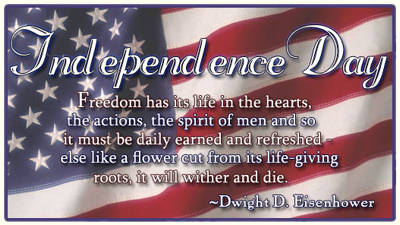|
The Right To Be Wrong
It is also a matter of record that the gentleman from Pennsylvania, John Dickinson, abstained from voting. The record indicates that Dickinson declined to vote again two days later, when the Continental Congress approved the final language of the Declaration of Independence. And when the Declaration was finally signed on Aug. 2, 1776, Dickinson chose to leave Congress rather than sign a document that he could not in good conscience support. Dickinson was not anti-American. When he left Congress, he joined the Pennsylvania Militia and led thousands of American troops against the British. He understood, as he wrote, that his fellow citizens were "resolved to die free men rather than live slaves." But deep in his heart he believed that reconciliation with the British was in the young country's best interest, and so he could not bring himself to vote to accept the Declaration. "My conduct this day, I expect will give the finishing blow to my once too great and, my integrity considered, now too diminished popularity," Dickinson said at the time. That did not actually prove to be the case, as there seems to be no indication of disdain, ostracism or contempt for Dickinson from either his peers in the Continental Congress or from his fellow citizens. Following his leadership in the Pennsylvania Militia, Dickinson was elected to significant political positions in both Pennsylvania and Delaware. And in 1787 he was a delegate from Delaware to the Constitutional Convention at which the Constitution of the United States of America was drafted and approved. This time Dickinson signed. Upon learning of Dickinson's death in 1808, Thomas Jefferson, primary author of the Declaration of Independence that Dickinson refused to sign, observed: "A more estimable man, or truer patriot, could not have left us. Among the first of the advocates for the rights of his country when assailed by Great Britain, he continued to the last the orthodox advocate of the true principles of our new government and his name will be consecrated in history as one of the great worthies of the revolution." Fascinating, isn't it? At a time of extraordinary political passion and patriotic fervor, Dickinson took a principled-but-unpopular stand. He looked up into the eyes of giants like Jefferson, Benjamin Franklin and George Washington and said, "Sorry, I think you're wrong." Even though they weren't – and he was. I'm impressed by his courage in conviction. I'm impressed by his single-minded integrity in the face of overwhelming public opinion. And I'm impressed by his willingness to stand with his neighbors, despite his feelings, and lead them to successfully battle – and eventually overcome – the very people with whom he had hoped for reconciliation. But as impressed as I am by Dickinson, I am equally impressed by the others of our Founding Fathers who seemed to actually believe the political doctrine that they were preaching. Although Dickinson refused to sign the document that they had signed, pledging "to each other our Lives, our Fortunes and our sacred Honor," they seemed to acknowledge – and even respect – his right to dissent. Unlike their "British brethren" against whom they were rebelling, to whom they had "appealed to their native justice and magnanimity" but who had "been deaf to the voice of justice and of consanguinity," the Founding Fathers allowed Dickinson the freedom to think his own thoughts and to espouse his own beliefs – even if they were wrong. So add that to the "unalienable Rights" you're celebrating this Fabulous Fourth. Life. Liberty. The pursuit of happiness. And the right to be wrong. <ValueSpeak@msn.com> Copyright © 2012 |



